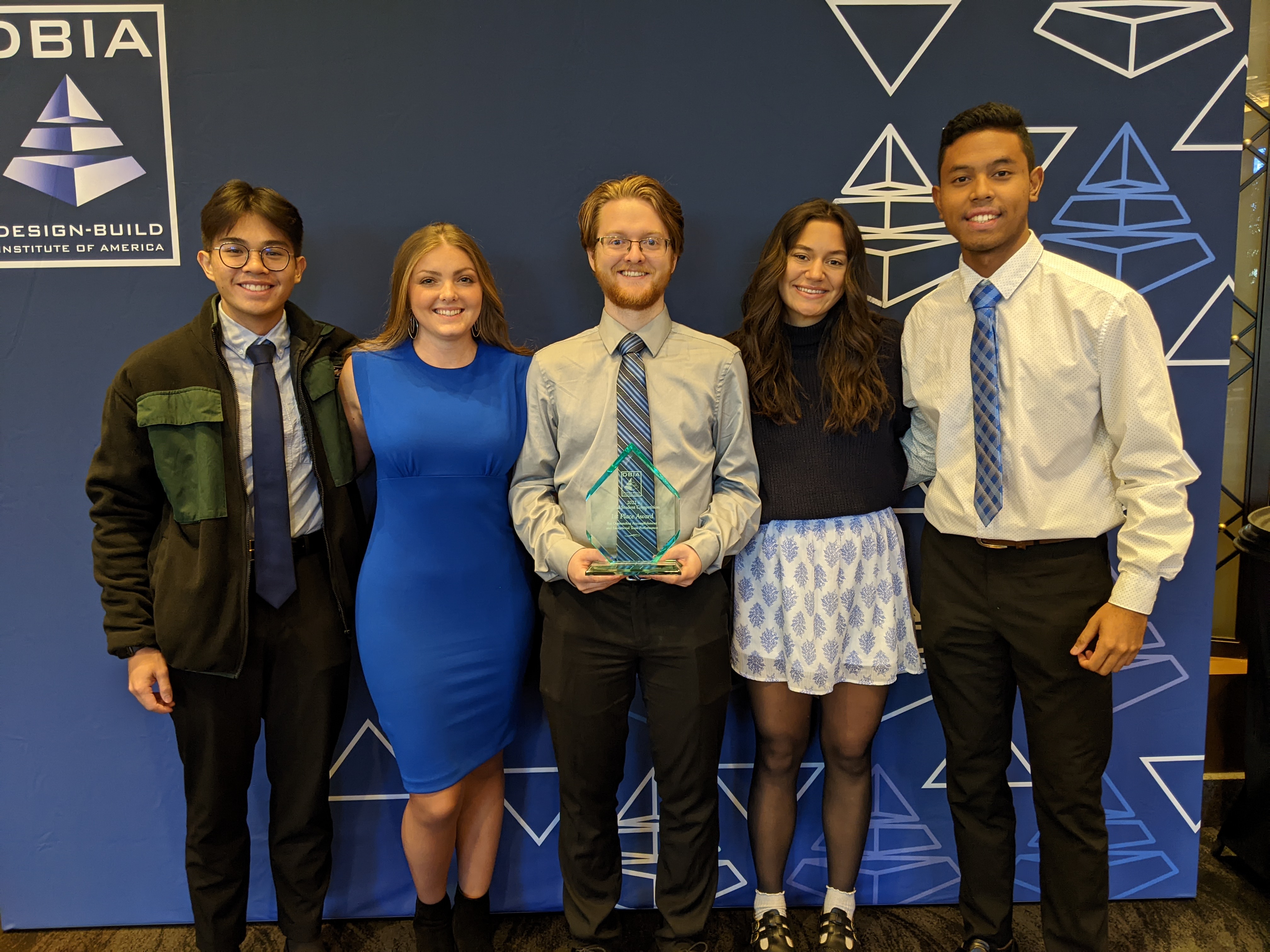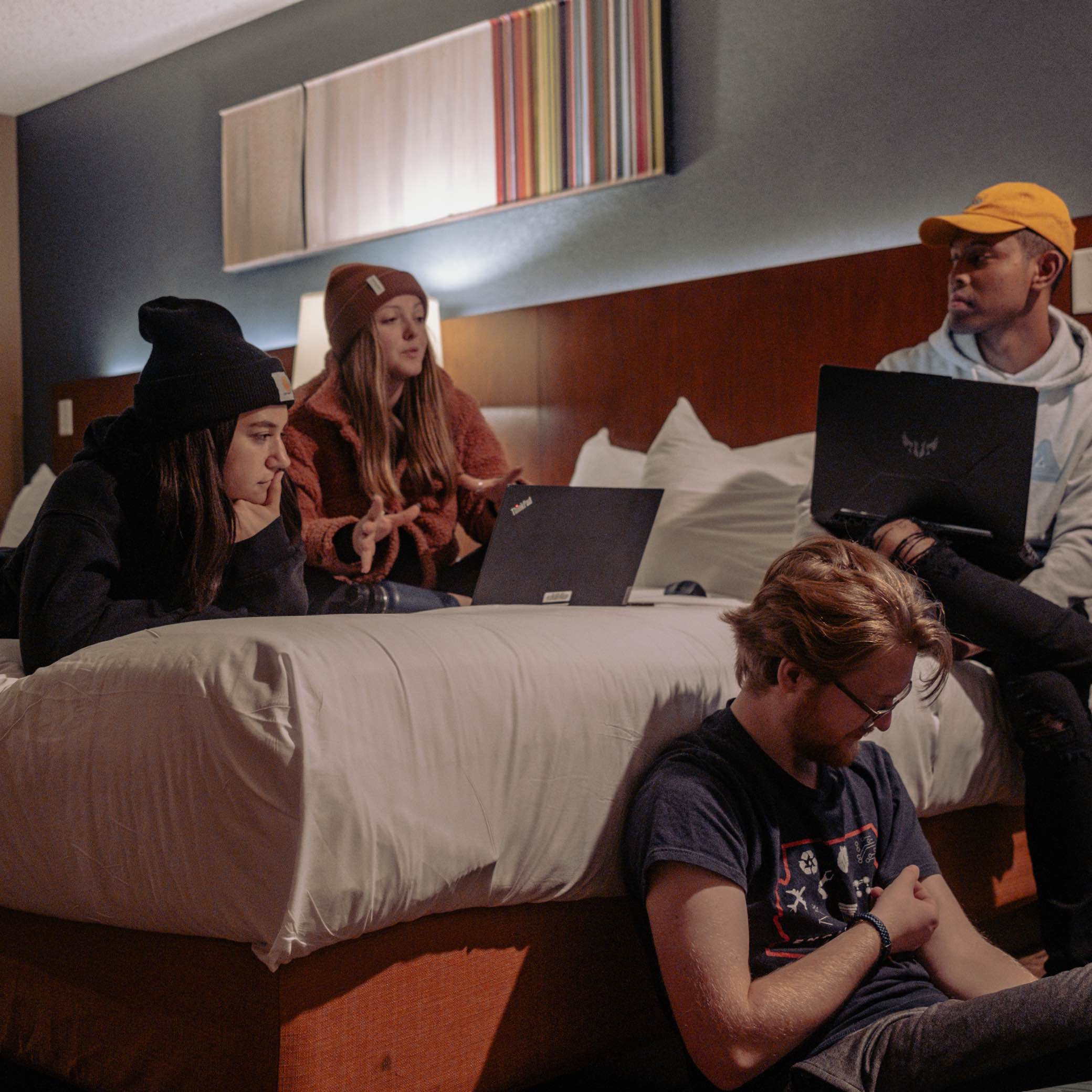
Three teams of five stood huddled on the Las Vegas stage in front of several hundred attendees during the Student Competition at DBIA’s Design-Build Conference & Expo this past November.
“University of Colorado at Boulder gets third place,” the announcer said.
Grant Hoffman looked over at his teammates, thinking, “Great work, guys! We got second place.”
“University of Florida gets second place.”
Everything got a little hazy for Hoffman. After over 1,200 hours of work, weekly meetings and late nights sitting around Hoffman’s place as the team combed through every word of the proposal, Hoffman couldn’t process they were about to win.
“And first place goes to the University of Arizona.”
Utter shock hit the Arizona team as the crowd erupted in applause. The team was wide-eyed, open-mouthed, staring at each other and wondering, “What the heck just happened?”
“Everyone goes in for a group hug, and I’m holding the trophy and just staring off the stage, just having no idea what’s going on,” Hoffman said. “I’m facing the completely opposite direction because I was just not coherent at that moment. It was just shock at that point.”
Two-Phase Competition Tests Students with Realistic Hypothetical

Every year, college students from around the country participate in DBIA’s National Design-Build Student Competition. The championship allows young design-builders to create a project as a team, present it to some of the industry’s leading pros and earn national recognition for their work. Of the 17 teams that competed, Hoffman’s team from the University of Arizona won last year’s competition.
The competition takes place in two phases. First, students respond to a Request for Qualifications (RFQ), in which the team presents their qualifications and crafts a document explaining their previous project work. Since most students are at the beginning of their careers, the backgrounds are fictitious, but the practice helps students think through what qualifications they would want their team members to have in this project.
A regional jury judges the RFQs in Phase 1 in one of the eight regional competitions. The regional winners are then issued the Request for Proposals (RFP) to be submitted to a national jury that selects the top three finalist teams. Regardless of the outcome of this round, all eight regional winners are invited to DBIA’s Design-Build Conference & Expo, taking place this year in National Harbor, MD, Nov. 1-3. Finally, the three finalists present their proposals in person to the national jury of prominent industry professionals from different segments of a design-build team.
In Phase 2, the three teams selected to submit an RFP explain how they would construct the project, and they present it before a jury of national judges, consisting of prominent design-build professionals from each segment of the design-build team.
There is also an award for one team member from the final 3 presenters for Best Individual Presentation.
Working with Student Teams Is Simply “Fantastic,” says Competition’s Founder
The competition started in 2012 after Dennis Ashley, who had been developing and running competitions in his Rocky Mountain region, was approached about creating a national version. The project students work on is unique each year. This year, it is an activity and recreation center on a liberal arts university campus in the U.S. Ashley creates the project as close to the real world as possible, giving the students a realistic simulation of planning a design-build project.
Ashley described his experience working with the student teams as simply “fantastic.” He’s seen students move on from the competition to positions throughout the industry. All the contestants he’s maintained contact with have said the competition has helped them in their careers.
DBIA Senior Director, Component Relations Salvador Chairez, who acts as Staff Liaison and Coordinator for the student competition, remembers taking the students to lunch during the competition and letting them fire questions at him about the competition as well as the industry more broadly.
“It was a very eye-opening and meaningful experience,” Chairez said. “I learned so much from the students as they were competing – the passion they brought and the willingness to learn. And there was a lot going on, but they were so ready for it.”
Important Competition Dates
Registration for this year’s competition runs through Sept. 1.
PHASE 1
| Team Registration | April 1- September 1, 2023 |
| Letter of Intent (LOI) from Team Faculty Advisor Due | September 4, 2023 |
| Request for Qualifications (RFQ) Issued | September 6, 2023 |
| Virtual RFQ Meeting—MANDATORY | September 8, 2023 |
| Request for Qualifications Due | September 22, 2023 |
| Region Competition Winners Announced | October 2, 2023 |
PHASE 2
| Request for Proposals Issued | October 2, 2023 |
| Virtual RFP Meeting—MANDATORY | October 5, 2023 |
| Request for Proposals Due | October 18, 2023 |
| Three Shortlisted Teams Announced | October 26, 2023 |
| Proposal Presentation in National Harbor, MD | November 2, 2023 |
| National Competition Winner Announced | November 3, 2023 |
DBIA’s Design-Build Conference & Expo will take place at National Harbor, MD, just outside of Washington, D.C., Nov. 1-3, 2023. All student groups are invited to attend even if they did not advance in the competition.
Some past winners have included:
